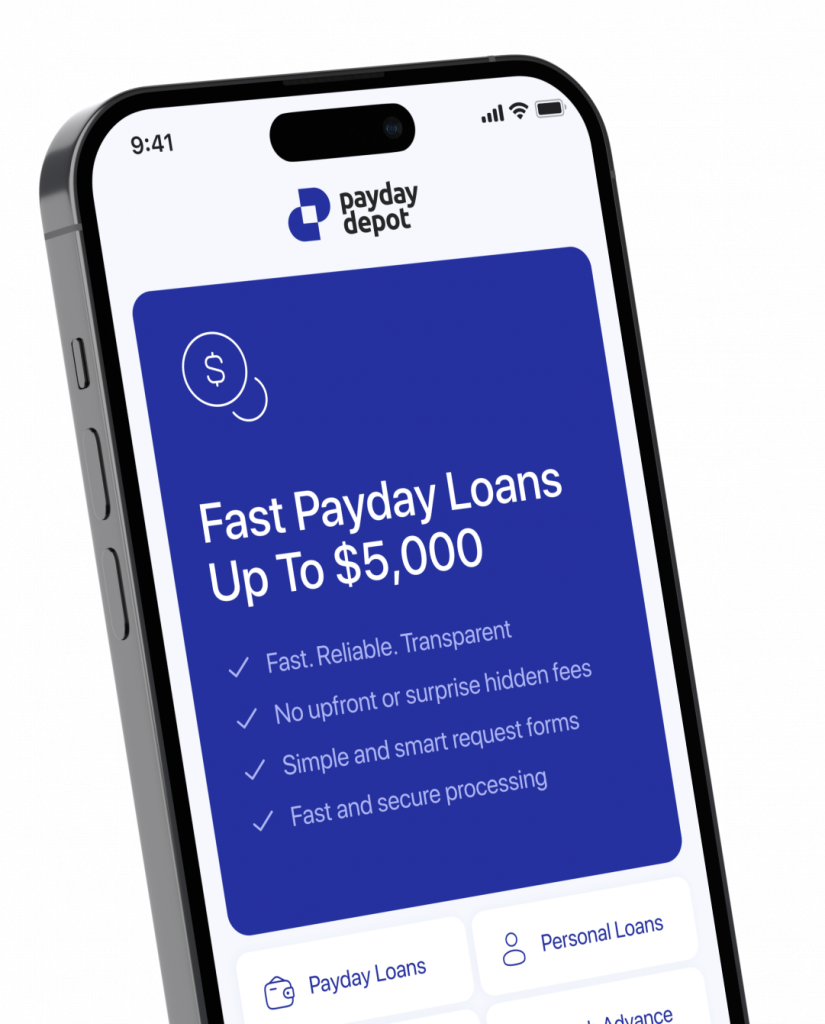 We are loan
We are loan matching service
We find and connect you with one of several lenders in our network.

No-credit-check loans
Imagine a world where your credit score doesn't define your financial destiny. No-credit-check loans can be a game changer in the lending world if your credit score is less than stellar, or if you have limited credit history.
No-credit-check loans provide a fast and accessible lifeline to you when you don’t have or want to put up collateral in exchange for quick money. Read on to uncover how these loans work, explore their unique advantages, and navigate the savvy ways to shop for the best deal.
- Loans without prior credit checks offer quick access to cash instant payouts but come with drawbacks such as higher interest rates, service fees, and shorter repayment terms.
- No-credit-check loans include installment loans, cash advance programs, and “buy now, pay later” programs. These are a lifeline for individuals with problematic credit histories. Since clients using this service don’t undergo a credit history check at all, it doesn’t hinder them from obtaining a loan. Funding is based on income, employment, and banking history (whether the borrower is a client of banking institutions, uses accounts, etc.).
- To obtain loans without credit checks, clients must be of legal age, have a steady income, and have an open bank account. Additional requirements may vary among lenders, emphasizing income thresholds, length of employment, and banking account status.
- Before obtaining a loan without a credit check, individuals should assess their financial situation, income, expenses, and repayment ability to ensure that the loan meets their needs and circumstances.
What Is a No-Credit-Check Loan?
A no-credit-check loan is an unsecured loan that doesn't require a traditional credit check as part of the application process.
In a typical loan application, lenders evaluate an individual's creditworthiness by reviewing their credit history. However, your credit history and score won’t factor into your eligibility when you apply for a no-credit-check loan. Instead of relying on credit checks, these loans focus on other factors, such as the borrower's income, employment status, banking history, and history of paying rent. As a result, they make financing accessible for borrowers with sufficient income but a troubled credit history.
The tradeoff you’ll have to accept for the convenience of skipping the credit check is that you’ll have to pay a higher interest rate than you would if you were applying for a traditional personal loan. However, the short repayment terms make up for these higher rates, since most no-credit-check loans must be repaid within a matter of days or months; unlike with personal loans, you won’t spend years paying off interest while you repay the loan.
In addition, no-credit-check loans are usually transacted for smaller amounts of money compared to traditional loans. And because you won't experience a hard credit pull when applying for the loan, your credit won't take a hit.
How Do Loans With No Credit Check Work?
Loans with no credit check typically work by assessing the borrower's eligibility based on factors other than their credit history or credit score. Here's a general overview of how these loans typically work:

1. Application
The borrower fills out an application provided by the lender. The application process will typically require that you provide personal information such as your full name, date of birth, and home address; employment details; income verification; and bank account information.
2. Alternative assessment
Instead of performing a traditional credit check, the lender assesses the borrower's ability to repay the loan through alternative means. This process involves verifying income, employment status, and bank statements to evaluate your financial strength.
3. Loan approval
If the borrower meets the criteria, the lender will approve the loan. In addition, the lender determines the loan amount, interest rate, fees, and repayment terms based on the information provided.
4. Loan agreement
Once approved, the borrower receives a loan agreement outlining the loan terms and conditions. It is essential to read this agreement carefully and understand the interest rates, fees, repayment schedule, and other pertinent details. This way, you'll understand what to expect after receiving the loan.
5. Disbursement of funds
Upon agreeing to the loan terms, the lender disburses the funds to the borrower. For example, you could receive a direct deposit to your bank account or a prepaid debit card.
6. Repayment
The borrower is responsible for repaying the loan according to the agreed-upon terms. This phase typically includes making regular payments, whether weekly, biweekly, or monthly, until the loan is fully repaid. However, your lender might allow you to roll an existing balance over into a new payday loan if you need more financing later on.
How Can I Get a No-Credit-Check Loan?
Here's how to navigate the process to get a no-credit-check loan:
Establish Your Basic Qualifications
Before pursuing a no-credit-check loan, it's essential to understand lenders' basic qualifications. Specifically, borrowers must be able to show proof of legal age (18 or older); provide a U. S. address of residence; show proof of a steady income source; and have a checking or savings bank account.
Consider Your Financial Circumstances
Evaluate your financial position to determine if a no-credit-check loan is the right option for you. Consider your income, expenses, and ability to repay a loan on time.
Find the Best Lender
Research and compare lenders offering no-credit-check loans. Doing so means gathering multiple offers to determine the most favorable terms, fees, interest rates, and customer service. Read customer reviews and check for any complaints or red flags associated with the lender. Choosing a trustworthy lender is essential to obtaining a stable loan.
Provide the Necessary Documents
Once you've chosen a lender, gather the necessary information and documents they require for the loan application. For example, you'll provide:
- Personal identification documents, such as a driver's license or passport.
- Proof of income, such as pay stubs, bank statements, or tax returns.
- Proof of residence, such as a lease agreement or a utility bill in your name.
- Bank account details including your routing and account number.
Finalize and Send the Application
Complete the lender's application form accurately and provide all the requested information. Double-check the form for any errors or missing details before submitting it. Some lenders offer online applications, while others might require you to visit their physical location or send the documents via mail.
After submitting your application and the required documents, you'll wait for the lender to review your information and decide on your loan application. The length of time for approval can vary depending on the lender and the specific loan product.
Many online lenders that offer loans with no credit check usually need just a few minutes to a couple of hours to assess your application once it’s fully complete. Once your application has been pre-qualified, you’ll receive a loan agreement from the lender of your choice. Finally, you'll review the documents and e-sign them if you're ready to move forward. In many cases, you’ll receive the funds you’ve borrowed within 24 hours of signing your loan agreement.
Types of No-Credit-Check Loans
No-credit-check loans come in multiple forms. Here are a few typical loans you can get without a hard credit check:

No-Credit-Check Installment Loans
Borrowers repay no-credit-check installment loans over a set period through regular payments. These loans provide borrowers with a lump sum upfront and charge equal monthly installments for repayment.
No-Credit-Check Cash Advance Apps
No-credit-check cash advance apps are mobile applications allowing users to access short-term cash advances or loans quickly, helping borrowers make ends meet until their next paycheck.
These apps don't perform credit checks, but evaluate the borrower's eligibility based on bank account activity. Borrowers can request a cash advance through the app and, upon approval, the funds are deposited into their bank account or made available for withdrawal. The borrower usually repays the balance, plus interest and fees, with their next paycheck.
No-Credit-Check Buy Now, Pay Later Apps
No-credit-check buy now, pay later apps offer a convenient way for consumers to make purchases and pay for them in installments without requiring a traditional credit check. These apps allow users to buy products up front and spread the cost over time. The app provider may conduct alternative assessments to determine the borrower's eligibility, such as income verification or a soft credit pull. Repayment terms and fees vary depending on the app.
Bad Credit Loan vs. No-Credit-Check Loan
A bad credit loan and a no-credit-check loan are options for individuals with less-than-ideal credit histories, but they differ in certain aspects. Specifically, one uses credit as a benchmark, while the other ignores credit altogether. Here's a comparison between the two:
Bad Credit Loan
A bad credit loan helps individuals with a poor credit history or low credit score, defined as a score between 580 and 669. Banks and credit unions offer bad credit loans so borrowers can access financing and reestablish good credit. Remember, lenders' specific credit score requirements for bad credit loans vary.
In addition, bad credit loans can be either secured or unsecured. Secured loans require collateral, such as a vehicle or property, to secure the loan. Unsecured loans do not require collateral, but may have higher interest rates and stricter terms.
An advantage of bad credit loans is that successful repayment can improve your credit score. Making timely payments demonstrates responsible financial behavior, which can positively impact your creditworthiness.
Because these loans are risky, lenders attach higher interest rates and fees to shore up potential losses. As a result, borrowers must pay higher interest rates, additional fees, and shorter repayment terms. Lenders will also limit the loan amount.
No-Credit-Check Loan
No-credit-check loans consider income, employment status, and banking history to determine a borrower's eligibility rather than relying on the borrower's credit history or score. Such loans are often available to individuals with limited credit history, no credit, or poor credit scores. However, it's crucial to note that these loans still have other criteria for approval, such as proof of income and a valid bank account, even if credit checks aren't part of the approval process.
While no-credit-check loans can be more accessible to individuals with challenging credit situations, they often come with higher interest rates, fees, and shorter repayment terms. Thus, it's essential to carefully review the terms and conditions of these loans before signing an agreement.
Advantages of No-Credit-Check Loans
No-credit-check loans benefit borrowers in the following ways:
No Credit Requirements
No-credit-check loans don't have requirements based on credit score or history. Instead, lenders check the borrower's income and employment, increasing accessibility for individuals with poor credit or no credit history. Therefore, borrowers who have faced past financial challenges or are just starting to build their credit can still be eligible for these loans if they demonstrate sufficient income.
Unsecured
Most no-credit-check loans are unsecured, meaning borrowers are not required to provide collateral to secure the loan. As a result, individuals can acquire a no-credit-check loan without worrying about the risk of losing valuable assets, such as their home or car, in the event of a loan default. In addition, the absence of collateral simplifies the application process, and reduces the paperwork involved.
Boost Your Credit Score
No-credit-check loans don't involve a hard credit pull from your lender. In addition, some lenders report on-time payments to the three major credit bureaus — TransUnion, Equifax, and Experian — which increases your credit score.
Quick Financing
Since no-credit-check loans do not involve time-consuming credit checks, the approval process is faster than traditional loans. This feature helps borrowers facing urgent financial needs or emergencies. For example, many lenders disburses funds within 24 hours of the borrower signing the loan agreement.
Short Repayment Period
No-credit-check loans typically come with short repayment periods. This way, borrowers can avoid long-term debt commitments. Short repayment terms mean borrowers can clear their debt within several weeks, meaning you won't have to manage a repayment period that drags on for years.

Other Loans That Don’t Require a Credit Check
No-credit-check loans aren’t the only financial funding options that allow borrowers to bypass a credit check. Here are two more alternatives to consider:
Remember:
PALs don't allow rollovers, a double-edged sword. As a result, borrowers can't roll over their loan into a new one and fall into snowballing debt. However, this rule also prevents you from putting part of your old PAL into a new one if you need more time to repay it.
Payday Alternative Loan (PAL)
A Payday Alternative Loan (PAL) is a short-term loan credit unions offer as an affordable alternative to traditional payday loans. The National Credit Union Administration (NCUA) regulates these loans and monitors how their features help borrowers. You'll need a membership at a chartered credit union (not a bank or online lender) to take advantage of this loan type.
One of the main advantages of PALs over payday loans is that they come with significantly lower interest rates compared to no-credit-check-loans. Specifically, federal regulations cap the interest rate on PALs at 28% APR, making them a more affordable option for borrowers. In addition, PALs have limited fees: the NCUA allows credit unions only to charge a modest application fee to cover processing costs. Furthermore, PALs usually have low to no credit requirements, increasing accessibility to borrowers.
There are two types of PALs: PAL I and PAL II. With a PAL I, your loan amount ranges from $200 to $1,000, and your repayment term is one to six months. Generally, you can access a PAL I after being a credit union member for at least a month.
In contrast, a PAL II provides up to $2,000 and 12-month repayment terms. And you don't have to wait a month after joining a credit union in order to qualify: You can receive this loan as soon as you become a member.
Remember:
Loans from friends or family members can have emotional implications. For example, borrowers may feel a sense of responsibility to repay the loan promptly, and lenders may worry about the borrower's financial well-being. On the other hand, borrowers might lag behind with payments and the lender with no recourse.
It's vital for borrowers to approach personal loans with the same level of seriousness and commitment as any formal loan arrangement. Clear communication, agreed-upon terms, and a repayment plan are crucial to maintaining a healthy relationship with the lender and avoiding potential conflicts.
Loan From a Friend or Family Member
A loan obtained from a friend or family member has several distinct characteristics compared to traditional loans from financial institutions. First, the loan is an informal arrangement based on trust and personal relationships. There might not be a formal written contract or extensive paperwork involved, but it's always advisable to generate some lecal documents outlining the loan terms to avoid misunderstandings.
In addition, your friend or family member won't apply stringent credit requirements or perform a hard credit pull compared to a traditional lender. However, this loan type also won’t count on your credit reports, meaning successful repayment won’t boost your credit score.
Loans from family and friends often come with more flexible repayment terms than loans from banks or credit unions. The two parties negotiate repayment schedules, interest rates (if any), and other terms based on mutual agreement and individual circumstances.
And since friends and family involve people who know each other personally, there is usually a deeper level of trust and understanding than there might be with an impartial financial institution. As a result, the lender may be more lenient and understanding if the borrower faces financial challenges during the repayment period.
How To Shop for No-Credit-Check Loans
Shopping for no-credit-check loans is like shopping for a typical loan. Here’s how to compare products between lenders and get the best loan for your situation:
Compare Interest Rates
To calculate the total interest paid on a loan, multiply the loan amount by the annual percentage rate (APR), then divide by 100 to convert it to a decimal. The formula for calculating total interest paid is:
Total Interest = (Loan Amount * APR) / 100
For example, here's how to calculate the total interest paid on a $3,000 loan with a 30% APR:
Total Interest = (3,000 * 30) / 100
Total Interest = 90,000 / 100
Total Interest = 900
So, the total interest paid on a $3,000 loan with a 30% APR would be $900.
Understand the Fees
Therefore, it's crucial to review the loan agreement carefully to identify all potential fees. Plus, you’ll know if you can pay off the loan early without getting hit with a penalty. Factor these costs into your decision-making process to ensure you know the total cost of borrowing.
Check Online Reviews
Review Your State Laws
Don't Fall for Scams

Conclusion
No-credit-check loans can be a viable option for individuals with limited credit history or poor credit scores, offering accessible financing in times of need. These loans assess borrowers based on other factors such as income, employment status, and banking history, making them a suitable choice for those with sufficient income but a troubled credit history. While the tradeoff for no credit check is often a higher interest rate, the short repayment terms help mitigate this issue, ensuring interest charges won't burden you for years.
Remember to be cautious and vigilant when dealing with lenders, as fraudulent offers exist. Stick to reputable lenders, avoid upfront fees, and never share personal information unrelated to the loan application. Responsible borrowing, thorough research, and understanding the loan terms will help you find a suitable no-credit-check loan that fits your needs, and enables you to address your financial requirements responsibly.
In order to uphold rigorous standards of accuracy and impartiality, Payday Depot mandates the use of primary sources by its writers. These encompass a range of materials such as white papers, government data, firsthand reporting. Additionally, we may draw upon original research from other trusted publishers when deemed relevant. For further insight into our editorial guidelines and commitment to delivering credible content, please refer to our editorial policy.
- Consumer Financial Protection Bureau — What Is a Payday Loan?
- Payday Loan Information for Consumers — Legal Status of Payday Loans by State
- Consumer Financial Protection Bureau — What Are the Costs and Fees for a Payday Loan?
- Payday Loan Information for Consumers — How Payday Loans Work
- Consumer Financial Protection Bureau — CFPB Data Point: Payday Lending
- California Department of Financial Protection and Innovation — Consumer Financial Education: Other Loans
- Consumer Financial Protection Bureau — CFPB Finalizes Rule To Stop Payday Debt Traps
- Code of Federal Regulations — Title 12, Chapter X, Part 1026 — Truth in Lending (Regulation Z)
- Consumer Financial Protection Bureau — Statement by CFPB Acting Director Uejio on CFPB Victory in Legal Challenge to Payday Lending Rule Protections
- Consumer Financial Protection Bureau, via Federal Register — Payday, Vehicle Title, and Certain High-Cost Installment Loans
- Consumer Financial Protection Bureau — Payday Loan Protections
- Consumer Financial Protection Bureau, via Federal Register — Payday, Vehicle Title, and Certain High-Cost Installment Loans; Delay of Compliance Date; Correcting Amendments
- Consumer Financial Protection Bureau — Payday, Vehicle Title, and Certain High-Cost Installment Loans
- Consumer Financial Protection Bureau — Do I Have to Put Up Something as Collateral for a Payday Loan?
- Consumer Financial Protection Bureau — I Heard That Taking Out a Payday Loan Can Help Rebuild My Credit or Improve My Credit Score. Is This True?
Ashley Kilroy began as a research analyst in 2013, later exploring finance at Matson Money. Shifting to marketing, she honed her skills at VolunteerHub and Simply Money Advisor. In 2018, Ashley founded Vim & Verve, which specializes in content creation and marketing. Her diverse expertise and commitment to excellence are showcased in her work for Forbes Advisor and Nasdaq. Read more
Katherine Fan currently works as a Travel and Personal Finance Expert, Writer, Editor, Photojournalist, and Photographer and has a small business. Her articles cover various topics, including personal finance, real estate, credit cards, insurance, investing, small business, loyalty programs, healthcare, and travel trends. She writes for USA TODAY, Yahoo, Forbes Advisor, and other well-known analytical platforms. Read more
Paul Sisolak, a seasoned journalist with 10+ years of experience in print newspapers, transitioned to freelance writing in 2011. His work appears on CNN, Yahoo Insider, and Business Insider. Paul holds degrees in Liberal Arts/Communications and Journalism. Besides writing, he provides proofreading, editing, and research services for quality and unique content. Read more


